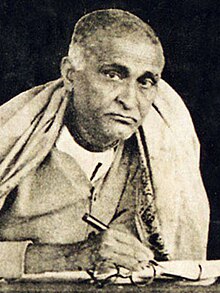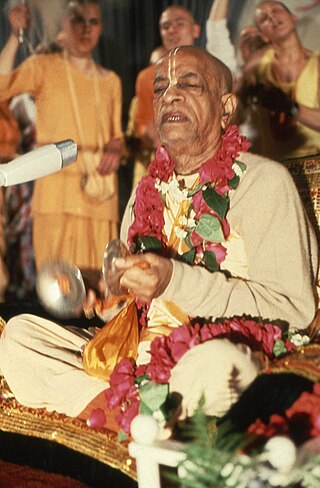
Abhay Charanaravinda Bhaktivedanta Swami Prabhupada was a spiritual,philosophical,and religious teacher from India who spread the Hare Krishna mantra and the teachings of "Krishna consciousness" to the world. Born as Abhay Charan De and later legally named Abhay Charanaravinda Bhaktivedanta Swami,he is often referred to as "Bhaktivedanta Swami","Srila Prabhupada",or simply "Prabhupada".

Chaitanya Mahaprabhu,born Vishvambhara Mishra,was an Indian Hindu saint from Bengal and the founder of Gaudiya Vaishnavism. Chaitanya Mahaprabhu's mode of worshipping Krishna with bhajan-kirtan and dance had a profound effect on Vaishnavism in Bengal.
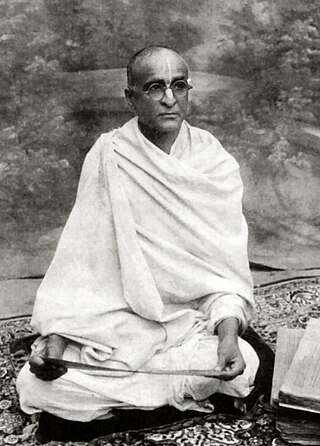
Bhaktisiddhanta Sarasvati,born Bimala Prasad Datt,was an Indian Gaudīya Vaisnava Hindu guru,ācārya,and revivalist in early twentieth-century India. To his followers,he was known as Srila Prabhupāda.

Gaudiya Vaishnavism,also known as Chaitanya Vaishnavism,is a Vaishnava Hindu religious movement inspired by Chaitanya Mahaprabhu (1486–1534) in India. "Gaudiya" refers to the Gaura or Gauḍa region of Bengal,with Vaishnavism meaning "the worship of Vishnu". Specifically,it is part of Krishnaism–Krishna-centric Vaishnavite traditions.

Bhaktivinoda Thakur,born Kedarnath Datta,was an Indian Hindu philosopher,guru and spiritual reformer of Gaudiya Vaishnavism who effected its resurgence in India in late 19th and early 20th century and was called by contemporary scholars as a Gaudiya Vaishnava leader of his time. He,along with his son Bhaktisiddhanta Sarasvati,is also credited with initiating the propagation of Gaudiya Vaishnavism in the West and its global spread.
The Oxford Centre for Hindu Studies,founded in 1997 and based in Oxford,England,is a research academy focused on the study and teaching of Hindu cultures of India and Nepal. It develops academic programmes of education,research and publishing in Hindu studies. It aims to encourage the Hindu community in the academic study of their own traditions and cultures. From 2006 to 2020,it was granted the status of a "recognised independent centre" working with the University of Oxford.

The Gaudiya Math is a Gaudiya Vaishnava matha formed on 6 September 1920,about 30 months after Bhaktisiddhanta Sarasvati took sannyasa,the renounced order of life. On 7 March 1918,the same day he took sannyasa, he established the Sri Chaitanya Math in Mayapura in West Bengal,later recognised as the parent body of all the Gaudiya Math branches. Its purpose was to spread Gaudiya Vaishnavism,the philosophy of the medieval Vaisnava saint Chaitanya Mahaprabhu,through preaching and publishing.
Swami Sadananda Das was born as Ernst-Georg Schulze in Germany. He met Swami Bhakti Hridaya Bon,a disciple of Hindu spiritual reformer Bhaktisiddhanta Sarasvati Thakura. Sadananda received diksa or formal initiation into the Gaudiya Vaishnava tradition through Swami Bon from Sarasvati,and later received the name Sadananda Das by Sarasvati directly after he had joined the Gaudiya Mission in Calcutta,India. He was one of the first known individuals who was not of Asian origin to embrace the Gaudiya Vaishnava tradition.

Vaishnavism is one of the major Hindu denominations along with Shaivism,Shaktism,and Smartism. It is also called Vishnuism since it considers Vishnu as the sole supreme being leading all other Hindu deities,that is,Mahavishnu. Its followers are called Vaishnavites or Vaishnavas,and it includes sub-sects like Krishnaism and Ramaism,which consider Krishna and Rama as the supreme beings respectively. According to a 2020 estimate by The World Religion Database (WRD),hosted at Boston University’s Institute on Culture,Religion and World Affairs (CURA),Vaishnavism is the largest Hindu sect,constituting about 399 million Hindus.

Bhakti Hridaya Bon,also known as Swami Bon,was a disciple of Bhaktisiddhanta Sarasvati and a guru in the Gaudiya Math following the philosophy of bhakti,specifically that of Caitanya Mahaprabhu and Gaudiya Vaishnava theology. At the time of his death,he left behind thousands of Bengali disciples in India.

Krishnaism is a term used in scholarly circles to describe large group of independent Hindu traditions—sampradayas related to Vaishnavism—that center on the devotion to Krishna as Svayam Bhagavan,Ishvara,Para Brahman,who is the source of all reality,not simply an avatar of Vishnu. This is its difference from such Vaishnavite groupings as Sri Vaishnavism,Sadh Vaishnavism,Ramaism,Radhaism,Sitaism etc. There is also a personal Krishnaism,that is devotion to Krishna outside of any tradition and community,as in the case of the saint-poet Meera Bai. Leading scholars do not define Krishnaism as a suborder or offshoot of Vaishnavism,considering it at least a parallel and no less ancient current of Hinduism.

Bhakti Prajnan Keshava,addressed by the honorific Mahārāja,was a Gaudiya Vaishnava guru,disciple of Bhaktisiddhanta Sarasvati and the founder-acharya of the religious organisation "Sri Gaudiya Vedanta Samiti",formed in Calcutta in 1940,and its headquarters,monastery Sri Devananda Gaudiya Math in Nabadwip.

Sri Devananda Gaudiya Math is situated at Teghori Pada in Nabadwip dham of district Nadia in the West Bengal state of India,and is a matha and prominent holy place of the Gaudiya Vaishnavas,as well the headquarters of the Sri Gaudiya Vedanta Samiti. It is located in the middle of the place earlier known as Koladvipa. Math has been continuing as a famous religious spot thronged by thousands of devotees every year.
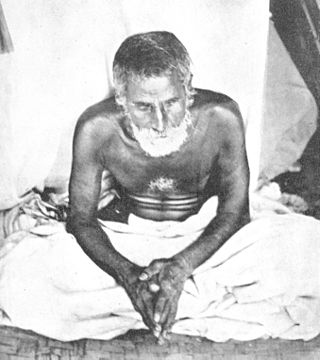
Gaurakisora Dasa Babaji is a well-known acharya from the Gaudiya Vaishnava tradition of Hinduism,and is regarded as a Mahatma or saint by followers of his lineage. During his lifetime Gaurakisora Dasa Babaji became famous for his teachings on the process of Bhakti Yoga and for his unorthodox avadhuta like behaviour as a sadhu,or babaji in Vrindavan.
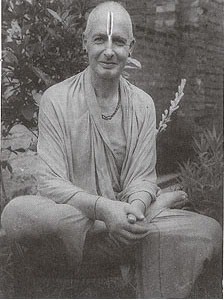
Sri Krishna Prem,born Ronald Henry Nixon,was a British spiritual aspirant who went to India in the early 20th century. Together with his spiritual teacher Sri Yashoda Mai,he founded an ashram at Mirtola,near Almora,India. He was one of the first Europeans to pursue Vaishnavite Hinduism,and was highly regarded,with many Indian disciples. Later,according to the account of his foremost disciple Sri Madhava Ashish,Krishna Prem transcended the dogmas and practices of the Gaudiya Vaishnava tradition into which he had been initiated and affirmed a universal spiritual path shorn of "orthodoxy" and blind traditionalism.
The Donner Institute for Research in Religious and Cultural History is a private institute in Finland maintained by the Åbo Akademi University. The Institute was founded in 1959 with an extensive donation by Uno and Olly Donner. It hosts the largest special library on Comparative Religion in the Nordic countries,supports research in the area of the Institute through grants,and organizes conferences and seminars. It publishes the journal Scripta Instituti Donneriani Aboensis.
This is a list of works by Bhaktisiddhanta Sarasvati (1874-1937),a Gaudiya Vaishnava leader and religious reformer. This list includes his original works,commentaries on canonical Vaishnava texts,and articles in periodicals Sajjana-toshani and the Gaudiya.

The Gaudiya Mission is a Gaudiya Vaishnava monastic and missionary organization. The organisation has been registered since March 1940 in Kolkata under the supervision of the then acharya,Ananta Vasudev,later known as Bhakti Prasad Puri Maharaj.
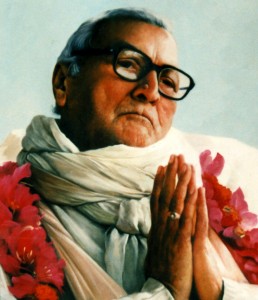
Bhakti Rakshak Sridhar was an Indian guru,writer,sannyasi and spiritual leader in the Gaudiya Vaishnava tradition of Chaitanya Mahaprabhu,founder-president-acharya of the Sri Chaitanya Saraswat Math.
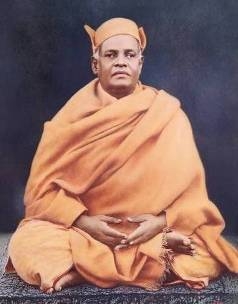
Swami in Hinduism is an honorific title given to an ascetic who has chosen the path of renunciation (sanyāsa),or has been initiated into a religious monastic order of Vaishnavas. It is used either before or after the subject's name. An alternative form,swamini,is sometimes used by female renunciates.

